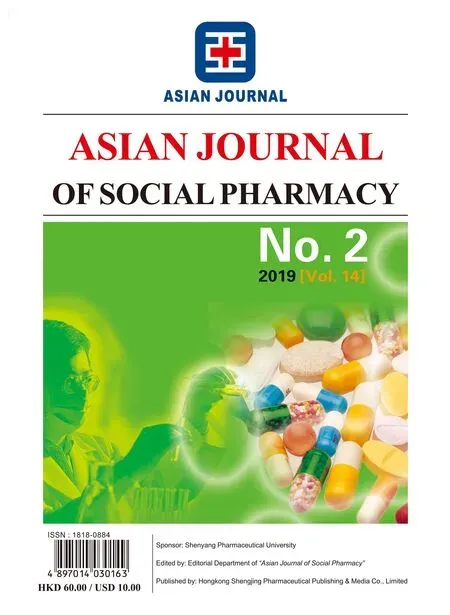A Study of Cognition and Demand of Pharmacy Services in Hospitals from the Views of Doctors, Pharmacists and Patients
2019-09-06XuZhimengDongLi
Xu Zhimeng, Dong Li
(School of Business Administration, Shenyang Pharmaceutical University, Shenyang 110016, China)
AbstractObjective To study the cognition and demand of pharmacy services in hospitals from the views of doctors,pharmacists and patients and to provide references for improving the quality of pharmacy services. Methods 3 level 2 hospitals and 3 level 3 hospitals in Beijing were selected and questionnaires for doctors, pharmacists and patients were distributed and collected. Results and Conclusion Cognitively speaking, 69.85% of doctors and 75.36% of pharmacists believe that pharmacy services are necessary, and 81.1% of patients believe it is helpful for pharmacists being involved in the process of treatment plans. Doctors and pharmacists themselves believe that the current pharmacist's service ability is still insuきcient, mainly due to the lack of clinical knowledge and the knowledge of medication combination. In terms of demand, doctors and patients have higher demand for pharmacy services, which is mainly involved in designing patient treatment plans, providing drug information and giving medication advice, and providing medication counseling. Doctors, pharmacists and patients all recognize and support the development of pharmacy services. However, in the understanding of the meaning of pharmacy services, doctors are better than pharmacists. Doctors and patients have greater demand for pharmacy services,but the supply of pharmacy services is still far from enough. It is recommended to strengthen the construction of related systems, incorporate pharmacy service work into hospital performance appraisal; attach importance to pharmacy professional talent training, improve pharmacy service ability, explore new hospital pharmacy service mode and to promote hospital pharmacy development.
Keywords: pharmacy service; cognition; demand; questionnaire
With the improvement of people's living conditions and medical service level, the disease spectrum is constantly updated. In order to cure more new diseases, researchers continue to develop new drugs, but adverse drug reactions also occur frequently. One-third of the global deaths each year are due to irrational use of drugs, and about 15% of hospitalized patients in the third world countries
have adverse drug reactions. More than 5 million people in China are hospitalized each year due to adverse drug reactions, and nearly 200,000 people died[1]. Increased use of drugs and frequent adverse drug reactions lead to an increasing risk of medication[2].
In 1990, Professor Hepler and Strand[3]proposed the concept of pharmaceutical services formally,which means that pharmaceutical service personnel can use pharmaceutical-related expertise or related tools to provide pharmaceutical services. Pharmacy services include drug consultation, clinical pharmacist participation in ward rounds, adverse reaction monitoring and treatment, blood drug concentration monitoring, medical record verif i cation, etc. They play the role of ensuring the efficacy of drugs, reducing the incidence of adverse drug reactions and the risk of contradictions between doctors and patients.The "Notice on Strengthening Pharmaceutical Administration to Transfer Pharmaceutical Service Model" jointly issued by the General Office of the National Health and Family Planning Commission and the Office of the State Administration of Traditional Chinese Medicine requires that all health and family planning administrative departments and medical institutions should attach great importance to the management of pharmacists that can promote the transformation of the pharmaceutical service model and strengthen the construction of the team of clinical pharmacists[4].
Patients and their families are the main targets of pharmaceutical services. Pharmacists are the providers of pharmaceutical services, but in the traditional medical service model, doctors are the pharmaceutical service providers. With the increasing medical work,pharmaceutical services should gradually return to pharmacy professionals. While doctors focus on providing medical services, they also need the support of more professional pharmacy practitioners to formulate scientific treatment programs jointly and improve the treatment results. In this paper,doctors, pharmacists and patients were selected as the research object to study their cognition and demand for hospital pharmacy services, and provide reference for improving the overall quality of pharmacists and enhancing the quality of pharmacy services.
1 Objects and methods
1.1 Survey object
Beijing was taken as the survey site, three secondary hospitals and three tertiary hospitals were randomly selected. And the sample size was distributed according to the relative proportion of doctors, pharmacists and patients in the secondary hospitals and tertiary hospitals. 30 doctors, 15 pharmacists and 50 patients were surveyed in each tertiary hospital and 20 doctors 10 pharmacists, 30 patients in each secondary hospital.
1.2 Survey contents
According to the different survey participants,different questionnaires were used respectively.As to doctors, they believed it was necessary to have pharmaceutical services, which included their cooperation with pharmacists, the recognition of pharmacist's duties and the current difficulties in pharmaceutical services. As to pharmacists, they were surveyed the necessity of carrying out pharmacy services, what responsibilities they had, the diきculties they encountered and their demands for career development. As to patient, they were surveyed the attitudes towards the service provided by hospitals,their requirements and opinions.
1.3 Data analysis
Epidata 3.1 was used for questionnaire entry and Microsoft Excel 2016 was applied for statistical analysis.
2 Results
2.1 Survey completion
The total sample size of the study included 150 doctors, 75 pharmacists and 240 patients. The actual number of questionnaires completed was 136 doctors, 69 pharmacists and 238 patients. The overall questionnaire recovery rate was 95.27%.
2.2 Doctors' awareness and needs for pharmaceutical services
Cognitively, 69.85% of doctors believed that it was necessary to implement pharmaceutical services.Most doctors believed that the implementation of pharmaceutical services could improve the quality of medical services, enhance the rational use of medicine for better effect, alleviate the relationship between doctors and patients, and establish the image of pharmacists. In terms of pharmacist's duties, most doctors thought that pharmacists were responsible for the storage and supply of drugs, the examination of new medicines for admission to hospitals, and monitoring adverse drug reactions. However, some doctors believed that the pharmacists' duties included assisting and monitoring the clinical medication,providing medication counseling services, and participating in pharmacy services such as ward rounds and consultations. It can be seen that doctors'perception of pharmacists' responsibilities was not limited to traditional pharmacy service modes.
68.38 % of doctors had communicated with pharmacists on treatment-related problems, including drug interactions (53.68%), medication precautions(45.59%) and medication use time and interval(42.65%), and 90.44% of doctors had cooperative needs for pharmacists, including participation in designing patient treatment programs (82.35%),providing drug information and giving medication advice (78.68%), participating in daily rounds and consultations (77.21%), monitoring blood drug concentration in critically ill patients (67.65%), and jointly discussing diきcult and serious cases (61.76%).In the evaluation of the current pharmacist's ability,91.18% of doctors believed that pharmacist lacked clinical knowledge, and 70.59% of doctors thought that pharmacist did not understand the combined medication. Doctors were difficult to carry out pharmacy service. The main reasons were that pharmacist's service ability was not strong (85.39%),the patient neither understand nor cooperate (68.38%),the leadership attached no importance (63.97%), and pharmaceutical service related system was not sound(55.15%).
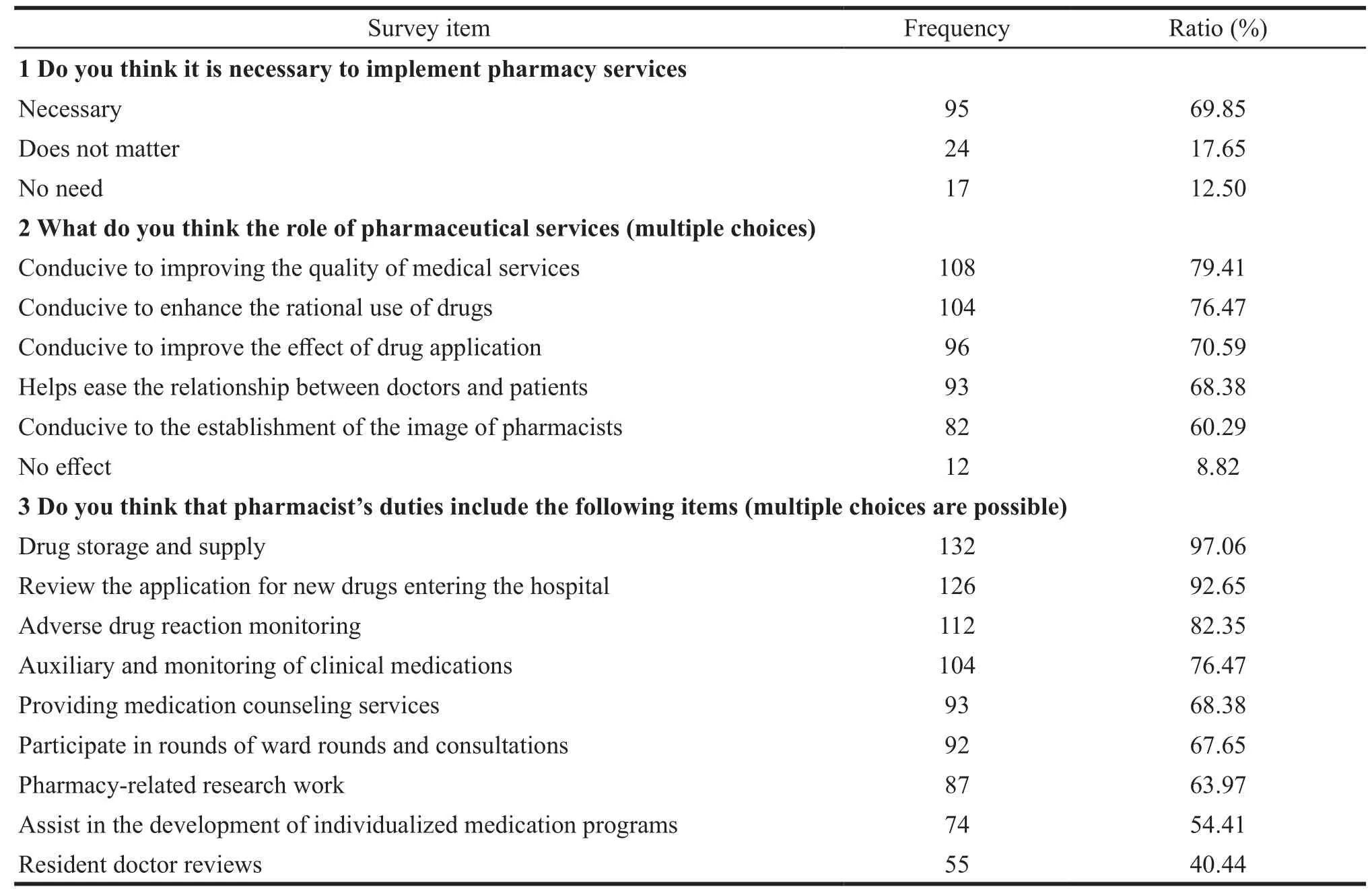
Table 1 Doctors' awareness and needs for pharmaceutical services

Survey item Frequency Ratio (%)4 What problems do you communicate with pharmacist (multiple choices)Drug interactions 73 53.68 Precautions for medication 62 45.59 Medication time and interval 58 42.65 Not communicated 43 31.62 5 Do you need pharmacists to cooperate with your work (multiple choices)To participate in the design of patient treatment plan 112 82.35 Provide drug information and give advice on drugs 107 78.68 Participation in daily rounds, consultations 105 77.21 Blood concentration monitoring for critically ill patients 92 67.65 Discussing together diきcult and serious cases 84 61.76 Do not need pharmacists to help work 13 9.56 6 What do you think the problems that current pharmacists have (more than one choice)Lack of clinical knowledge 124 91.18 Do not understand the combined medication 96 70.59 Lack of medication knowledge 64 47.06 7 Reasons why pharmacy services are diきcult to carry out (multiple choices are possible)Pharmacist service capacity is not strong 116 85.29 Patients do not understand and do not cooperate 93 68.38 Leadership attention is low 87 63.97 Inappropriate pharmaceutical service system 75 55.15 Doctors do not support and do not cooperate 43 31.62 The workload of pharmacists is already very large 35 25.74
2.3 Pharmacists' perceptions and opinions on pharmaceutical services
Cognitively, 75.36% of pharmacists believed that it was necessary to implement pharmacy services,but pharmacist's responsibilities were different from doctors. Most pharmacists still had limited knowledge of their own responsibilities, which mainly included drug storage and supply (97.10%),reviewing the application for new drugs (89.86%) and providing medication counseling services (73.91%).Few pharmacists thought that they had other responsibilities, indicating that they did not understand pharmacy services and their responsibilities. At the same time, the actual work done by pharmacists was quite different from the requirements of pharmacy services. They still stuck to traditional pharmacy services, such as drug storage and supply (92.75%),reviewing new drugs (75.36%) for admission to hospitals, and providing medications, consulting services (69.57%), pharmacy-related research work(40.58%), participation in rounds and consultations(24.64%), assistance in formulating individualized medication programs (23.19%), monitoring drug adverse reaction (21.74%), assistance and monitoring clinical medication (18.84%). But resident medical advice (11.59%) was relatively rare.
Among the difficulties encountered by pharmacists in providing pharmaceutical services,the most popular one was that patients had low recognition of pharmaceutical service personnel(84.06%), followed by inadequate national regulations(76.81%), and management departments' less attention to pharmaceutical services (75.36%), and medical staff's less attention to pharmacy services (68.12%).In the survey, pharmacist believed that if all the listed pharmacy services were to be carried out, the first obstacle was the lack of clinical knowledge (88.41%),ignorance of combined medication (69.57%), heavy workload (66.67%), lack of drug treatment knowledge(60.87%) and insufficient communication skills(46.38%). In the future, they wanted to obtain basic clinical knowledge (91.30%), pharmacy expertise(82.61%), clinical medication experience (81.16%)and communication skills (69.57%).
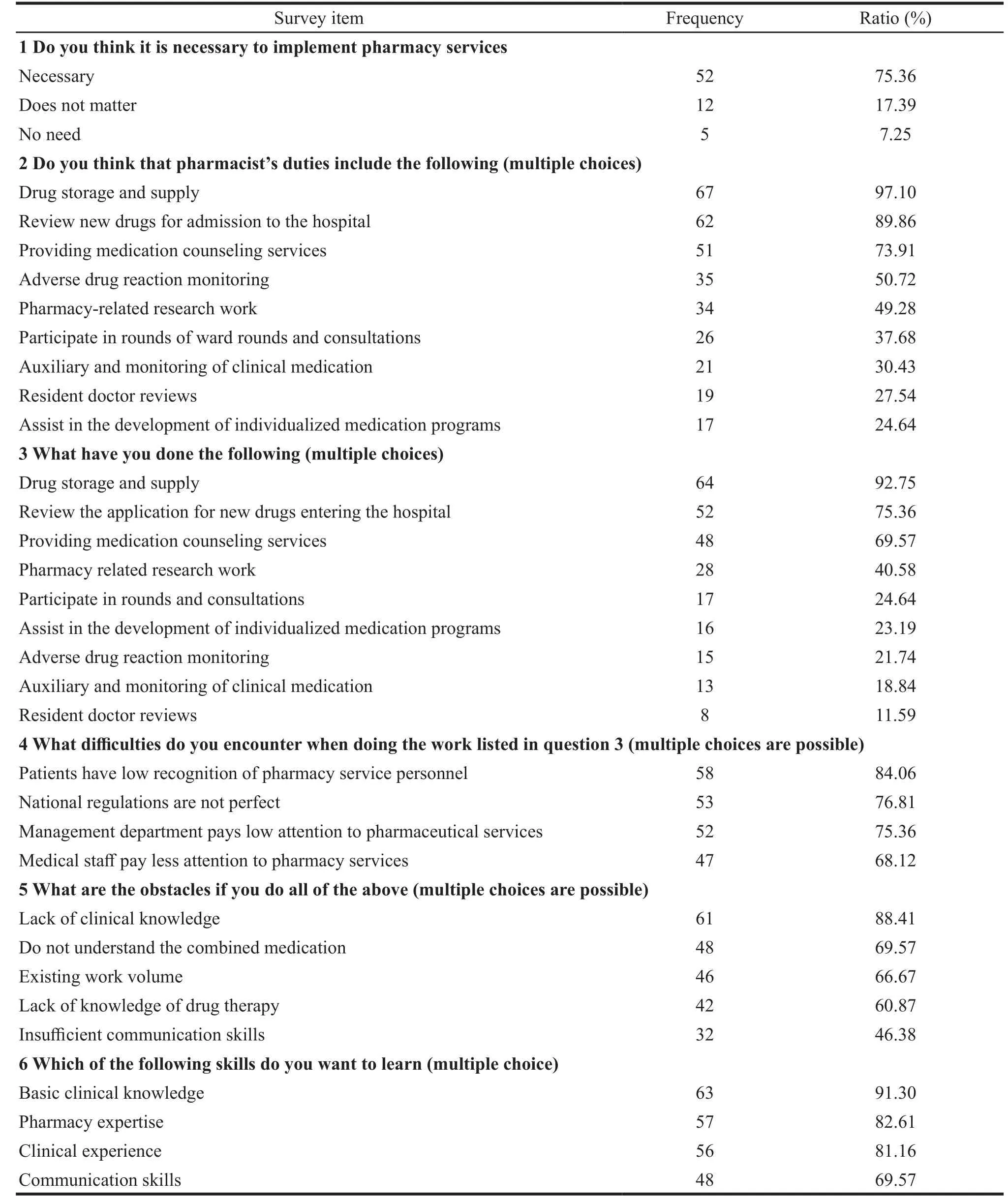
Table 2 Pharmacists' perceptions and opinions on pharmaceutical services
2.4 Patient's knowledge and needs for pharmaceutical services
According to the survey results, patients had a higher overall concern about the medication problems.In the normal medication, they were more concerned about possible adverse drug reactions (95.38%),medication time (before and after meals) (89.92%),precautions during medication (78.15%), combined medication sequence (76.47%), right time to stop the drugs (66.81%), and ways of reducing expenditure of drugs (55.46 %). Due to the professionalism of medical knowledge, patients could not understand drug instructions clearly. Only 24.37% of patients could understand the manual. Most patients (66.81%)could only understand some of the contents, which hindered the rational use of drugs.
As to the attitude towards pharmacy services,81.1% of patients believed that pharmacists were involved in the formulating treatment plan, and 88.24% of patients supported and cooperated with hospital pharmacy services. But in actual work,15.13% of patients did not receive any pharmacy services. Among the patients who received pharmacy services only got some medication counseling services (78.15%), while those who were able to enjoy pharmaceutical care, pharmacy ward rounds and consultation services accounted for 39.5% and 30.67%. A survey of 152 patients who received pharmacy services indicated that pharmacy service staあ lacked clinical expertise (78.29%), lack of work experience (61.84%), and unreasonable service methods (54.61%). In the future treatment, the desired pharmaceutical services included drug consultation(89.92%), drug adverse reaction monitoring (82.35%),pharmacists participation in rounds and consultations(73.53%), and assisting doctors to formulate individualized medication plans (68.49%).
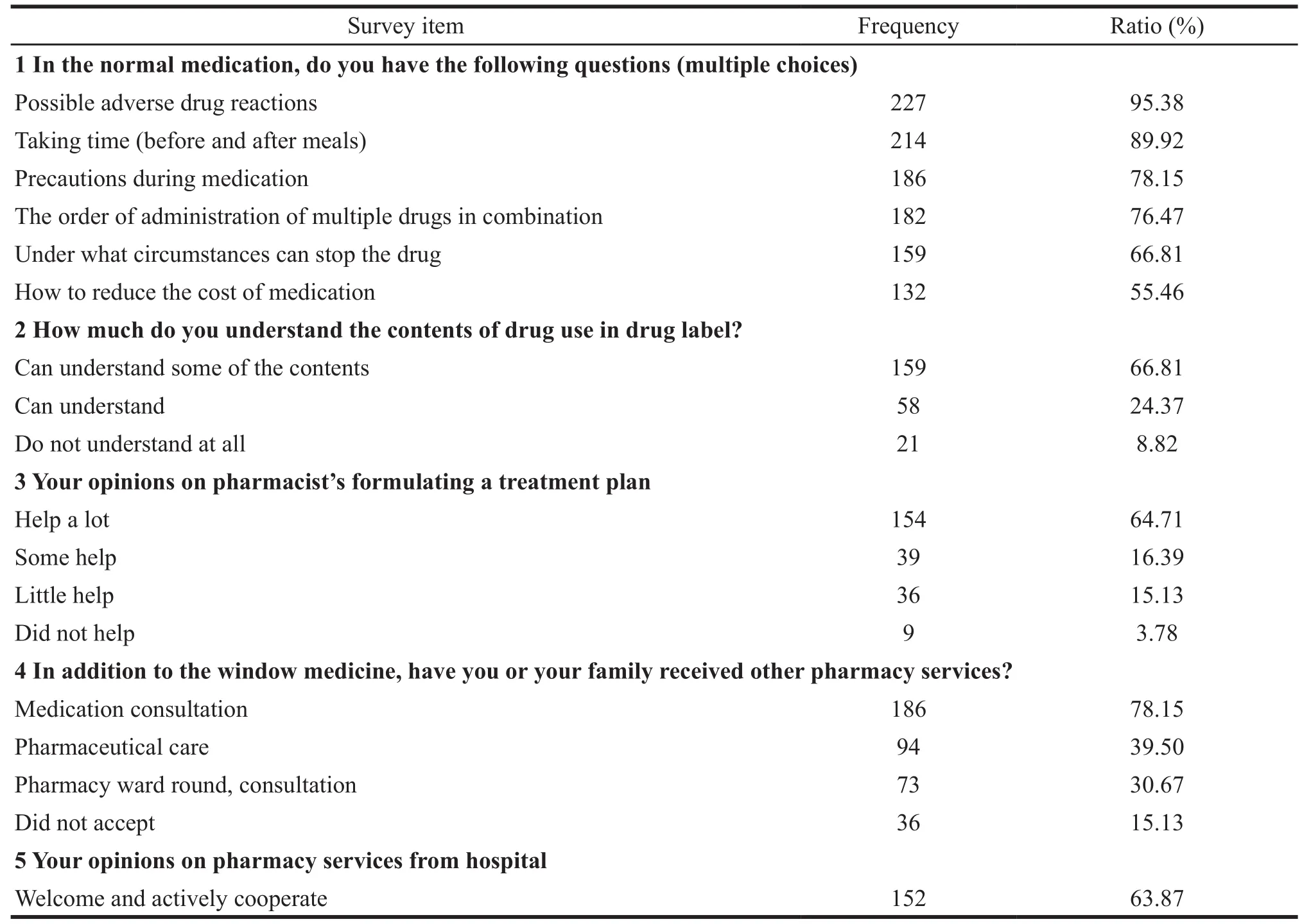
Table 3 Patients' perceptions and opinions on pharmaceutical services
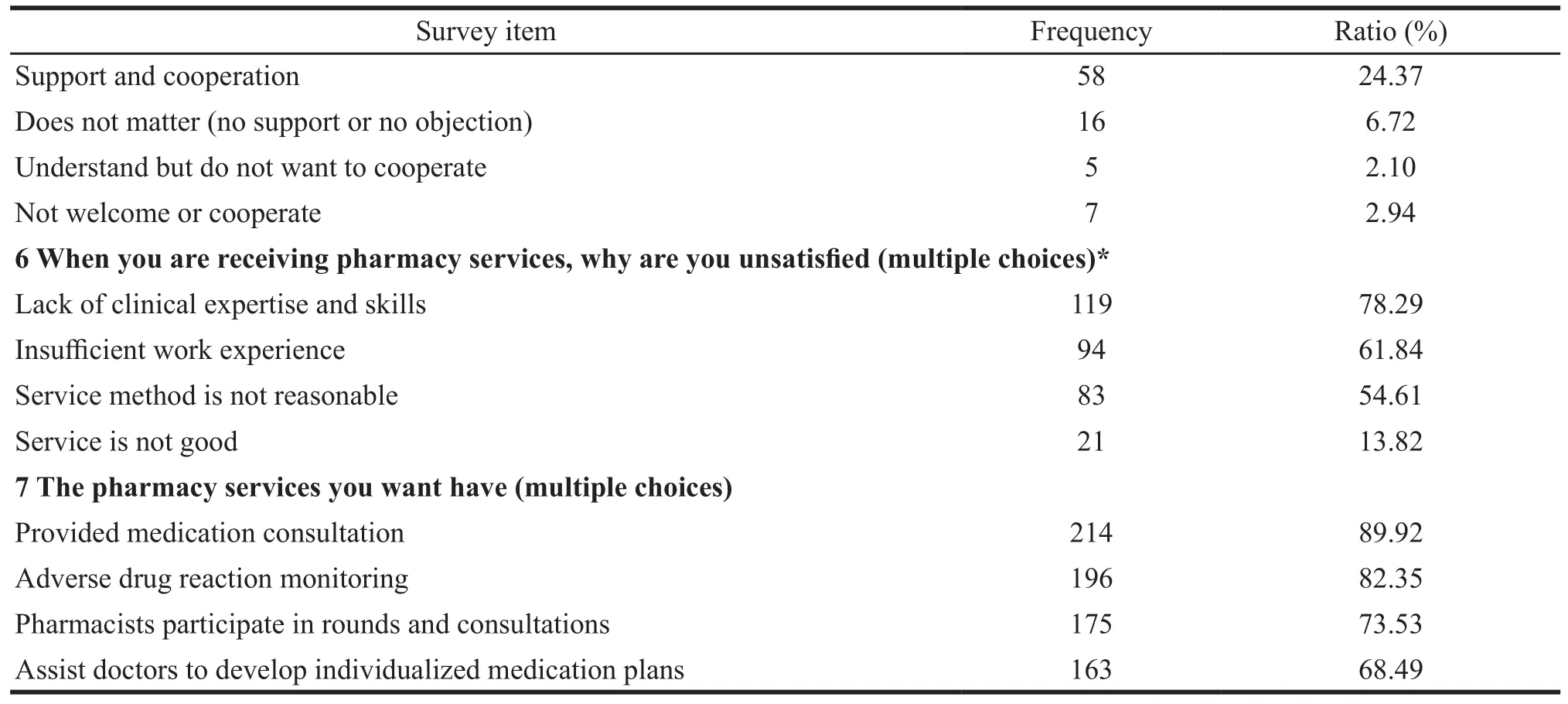
*Note: The patient who answered question 7 had received pharmacy service in question 4.
3 Discussions
3.1 Cognition of pharmaceutical services from three parties
Doctors, pharmacists and patients expressed their approval and support for the development of pharmaceutical services. But doctors were better than pharmacists in understanding the meaning of pharmaceutical services, which came from doctor's own clinical work experience. And it was also the result of a long term traditional medical care mode. Under such a service model, the single drug distribution and supply work reduced pharmacists awareness of their professional value, which made it difficult to change the quantity and quality of pharmaceutical services[5-6]. Pharmacists were not fully understand the role of participating in rounds of consultations, assisting and monitoring clinical medications, inpatient medical advice, and assisting in formulating individualized medications. Most pharmacists did not realize that this was their own job and their understanding of pharmaceutical services was incomplete. Because of this, in the actual work,pharmacists focused more on the traditional work areas such as drug dispensing. Therefore, their work related to drug guidance and clinical drug guidance was insuきcient, which was consistent with the results of other similar studies[7-9]. From the above points,the survey results showed pharmacists failed to answer the questions raised by doctors in real work due to their lack of clinical knowledge, disease and combined medication knowledge and experience[10-11].Because China's policy on clinical pharmacists was not perfect, it did not clarify the legal responsibility of pharmacists in participating in the treatment, doctors had some concerns when adopting pharmacists'recommendations[12].
3.2 The need for pharmaceutical services from three parties
As the main provider of pharmacy services,doctors and patients are the service target of pharmacists. The results of this study showed that there was a greater need for medication counseling,adverse drug reaction monitoring, participation in ward rounds and consultations, and assisting doctors in formulating treatment options. This was similar to the research results of Doloresco F.[13]. These needs make pharmacist's work no longer the simple supply of drugs, but more professional knowledge. They should oあer drug-related information, as well as more complex medical treatment programs, adverse reaction monitoring, medical advice and so on. The survey results showed that doctors and pharmacists did have exchanges in treatment and medication. However,because of pharmacists' lack of clinical knowledge and ignorance of the combined medication, the level and frequency of communication were relatively fewer. But doctors also proposed their urgent need for cooperation with pharmacists, reflecting the large contradiction between the supply and demand of pharmaceutical services. This also put higher requirements on pharmacist's service ability. The surveyed pharmacists also agreed that in the future work, they should pay attention to the cultivation of basic clinical knowledge, pharmacy expertise,and clinical drug experience and communication skills. At the same time, they should also carry out other scientific research such as drug evaluation and quantitative pharmacological analysis[14]to improve their service capabilities and better adapt to the needs of pharmaceutical service mode.
4 Recommendations
4.1 Strengthening the construction of relevant systems and taking pharmacy services into hospital performance appraisal
The system construction of pharmaceutical services needs to be strengthened. In the future work,professional titles, duties and welfares of pharmacists should be gradually clarif i ed. Meanwhile, and policy support and welfare guarantee for pharmacists should be provided to promote the healthy development of pharmacists' profession. In addition, relevant contents of pharmaceutical services should be included in the hospital's performance evaluation so as to enhance the awareness of pharmacy services in hospitals and pharmacists. Hospital authorities should change the concept and regard pharmacy services on the same level as medical care and nursing so that pharmacists can have a good development environment. And a fair and equitable assessment mechanism should be established based on the contents of pharmaceutical services and patient satisfaction. The enthusiasm of pharmacists should be fully mobilized from the job title assessment, bonus distribution and other aspects.
4.2 Paying attention to the cultivation of pharmacy professionals and improving pharmacy service level
Health administrative departments and hospitals should focus on the cultivation of pharmaceutical professionals, attaching importance to continuing education, and providing a good learning environment and promotion opportunities for pharmacists. In the process of training pharmacists, to the contents should cover clinical, pharmacy and other fields such as sociology, psychology and humanities. In addition to professional quality, pharmacists should improve their psychological quality and communication skills as well. Hospitals can also set up a medical cooperation platform for doctors and pharmacists so that pharmacists can closely contact clinical work, which promotes their learning through practice and improve their comprehensive service ability.
4.3 Exploring new hospital pharmacy service model and promoting the development of hospital pharmacy
With the gradual deepening of medical reform,the transformation of pharmaceutical service model also becomes urgent. The patient-centered concept makes pharmacists not only care about the supply of medicines, but also take the responsibility of their own with doctors and nurses. But to achieve this concept,we need to explore a new model of pharmaceutical services to promote the development of hospital pharmacy. Pharmacy services should be placed in the same position as medical services and nursing services. Based on functional orientation, hospital's pharmaceutical organization should make full use of information technology and innovative pharmaceutical service models to provide patients with efficient,convenient and accurate pharmaceutical services.
杂志排行
亚洲社会药学杂志的其它文章
- Reducing the Error Rate of Drug Delivery in Hospital Pharmacies: From the Angle of Pharmacy Quality Control Circle
- Discussion on Drug Procurement with Target Quantity in China and Its Problem
- The Regulating Eあect of Complementary Assets on the lncremental lnnovation of Traditional Chinese Medicine Enterprises
- SWOT Analysis and Development Suggestions on HK Drugs of G Pharmaceutical Firm
- Ref l ections on the Management of Preventing lnterest Conf l ict among Pharmacopoeia Members
